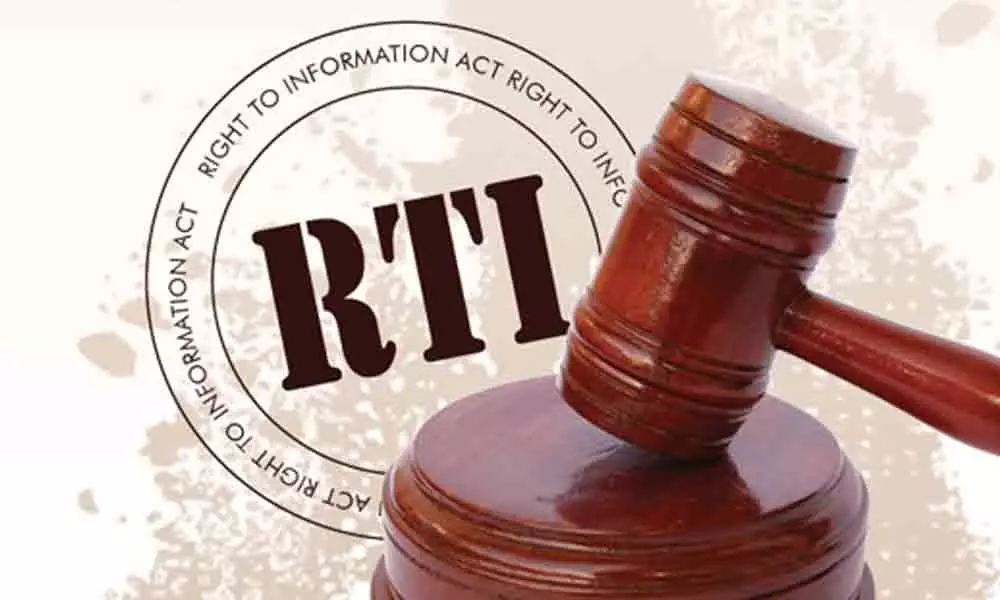Live
- ICC chief Jay Shah meets Brisbane 2032 Olympics organising committee CEO
- Oxford Grammar High School Celebrates 44th Annual Sports Day with Grandeur
- Indian banking sector’s health remains robust, govt policy working very well: Top bankers
- iOS 18.2 Unveiled: New Features with ChatGPT Integration Revolutionize Your iPhone
- 'Run for Viksit Rajasthan' to be annual event, says CM Sharma
- Nitish Kumar launches '109 free medicine vehicles' in Patna
- India have to play their best cricket at the Gabba to win series: Harbhajan
- Income tax refunds jump 46.3 pc to Rs 3.04 lakh crore in April-Nov
- Financial Intelligence Unit detects undisclosed income worth Rs 11,000 crore in 2024: Centre
- Odisha BJP chief to be elected in January
Just In
RTI amendment erodes commissioners freedom: Jairam; Supreme Court notice to government


The Supreme Court on Friday issued notice on a plea filed by senior Congress leader Jairam Ramesh contending that the amendment to the RTI Act violates the object of the parent statue, by curbing independence of Information Commissioners, and also infringes fundamental right to information guaranteed under the Constitution.
New Delhi : The Supreme Court on Friday issued notice on a plea filed by senior Congress leader Jairam Ramesh contending that the amendment to the RTI Act violates the object of the parent statue, by curbing independence of Information Commissioners, and also infringes fundamental right to information guaranteed under the Constitution.
The Right to Information (Amendment) Act 2 gives power to the government to prescribe tenure, allowances and salary of Information Commissioners, and run contrary to the statement of objects and reasons (SOR) of the RTI Act, 2005, he said.
"The decision of the Central government is binding upon the Information Commissioners. This allows unbridled and uncanalised discretionary power to the Central Government that jeopardises the independence of Information Commissioners," said the plea filed by Ramesh, who is also a Rajya Sabha member.
The plea, filed through advocate Sunil Fernandes, also contends that assuming the RTI Amendment Act merely delegated rule-making power to the Central government without thwarting the independence of Information Commissioners, "its accompanying RTI Rules complete the destruction of the independence of Information Commissioners."
The SC issued notice to the Centre and asked it to respond within four weeks. The plea cited Rule 22 of the amended RTI Act, which empowers the Centre with the discretionary "power to relax" the applicability of the provisions of RTI Rules for any class or category of persons in the Central Information Commission (CIC) and State Information Commission (SIC).
This is an alarming concern about the government''s potential to invoke excessive powers to determine selective tenures, terms and conditions for different Chief and Information Commissioner at the time of appointment, as per its whims and fancies, the petition said.
Citing rule 23, it said: "Under this rule, the final interpreter of all the rules rests with the Central government. This grants the Central government excessive power over governing the salaries, allowances and service conditions of Information Commissioners."
Ramesh contended the Amendment Act altered the architecture of independence of Information Commissioners -- it altered the erstwhile fixed tenure of 5 years of the Central Information Commissioners, granted absolute power to Centre to prescribe the salaries, allowances, and terms and conditions of service of the Central Information Commissioners, and explicitly granted rule making power to Centre over fixing the tenure, salaries and service conditions of Information Commissioners.
The petition also contends the RTI Amendment Act and its accompanying rules collectively "abrogate the independence of Information Commissioners."
The petition claims the tenure of Information Commissioners is subject to the will of the Centre. Ramesh urged the top court to pass appropriate order or direction to declare and set aside the Right to Information Amendment Act, 2019 and its accompanying Right to Information (Term of Office, Salaries, Allowances and Other Terms and Conditions of Service) Rules, 2019 as ultra vires to the aims and objects of the RTI Act, 2005 and the Constitution.

© 2024 Hyderabad Media House Limited/The Hans India. All rights reserved. Powered by hocalwire.com






